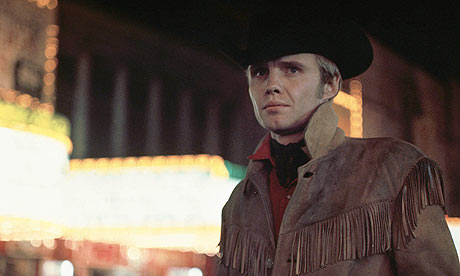
In Midnight Cowboy, New York is a site of aspiration, then frustration, then desperation, then expiration, near as dammit. The plush, red-curtain-draped Manhattan screening room of the Academy of Motion Picture Arts and Sciences – located on 57th Street, a few dozen yards east of Carnegie Hall and west of Tiffany & Co – is not the sort of place frequented by the film's leads: the naïve, corn-fed would-be gigolo Joe Buck (Jon Voight) and the wretched, retching scam artist Enrico "Ratso" Rizzo (Dustin Hoffman). But this was where the movie's 40th anniversary was celebrated this week, with a special screening followed by onstage discussion with members of its cast and crew, an eight-foot Oscar peering over their shoulders all the while.
With his Stetson and cowboy boots, Texan Joe seems to belong to the strain of American ambition that drives west. But with almost his first words he tells us he's "heading up east". He's no real wrangler but a butch-flavoured dandy (any doubts on that front are surely put to rest by the sight of his pony-skin valise) and fancies he can profitably put himself out to stud with those rich city women. His excitement at reaching the city, however, soon dissipates in the face of its harsh apathy. Ratso, who seems to have been cultured from the detritus of some scuzzy sidewalk gutter or grotty short-order kitchen, is only one of the handful who exploit and demean him. Like the clattering subway, he appears in Joe's dreams as an emblem of alienation, but he turns out to be another lost soul.
The friendship they warily cultivate is expressed through a bickering and sniping that masks real tenderness, and stands in defiance of the city, which is depicted in alternately realist and expressionist modes. After the screening, cinematographer Adam Holender described the long walks he and the late director, John Schlesinger, took around the Garment District, Seventh Avenue and 42nd Street ahead of the shoot – a Pole and an Englishman trying to see New York through Joe's outsider eyes. If the city's combination of efficient indifference and electrifying opportunity seems perfectly contemporary, much of what Joe experiences is still specific to the time of the movie's production: there's a wild party featuring Warhol apostles Viva, Ultraviolet, Taylor Mead and Paul Morrissey, and a cheap hotel room in what would now be prime real estate with a Times Square view. A decade before Travis Bickle's rampage, the marquees promise Twisted Sex.
The post-screening panel also included United Artists executive David Picker, the movie's producer Jerry Hellman and its costumier Ann Roth. There was much praise for Schlesinger and many recollections of his pessimism about getting the story accepted by either the studio – "He was right," Picker said, "it was pretty depressing" – or audiences. "Do you really think anybody in their right mind is going to pay money to see this rubbish?" Hellman recalled him asking before the first screening.
Also present was Sylvia Miles – she played Joe's first conquest, a wealthy housewife, and was nominated for an Oscar despite appearing in only a couple of scenes. Dressed in a black coat, shades and beret, from beneath which jutted two wedges of white hair, Miles recalled in her thick New York honk how, following the announcement of the project, she bummed a ride with Hellman after he saw her in a play, determined to net the housewife role. She recalled telling herself "I only got a few blocks between 81st Street and Columbus Circle to get this part" but, as she recounted, left the car on the verge of tears after Hellman told her it would go to a more famous name. As is perhaps to be expected at a distance of four decades, memories did not always corroborate one another. "I am not going to tell my recollection of that story," Hellman said, "because it's so completely different people will think we were on different continents. But I made the film and she got the part."
At other times, Miles struggled to get a word in. "It's bad enough I only had six minutes in the movie," she griped. The dynamic of the panel could take on the fractious, intimate feel of a family dinner: "That's entirely inaccurate," one member chided another while discussing an aspect of the script's development. "Well, you weren't there," the other replied replied. "I was there," the first snapped back. You'd hope the sniping masked affection. Joe and Ratso would know the feeling.







